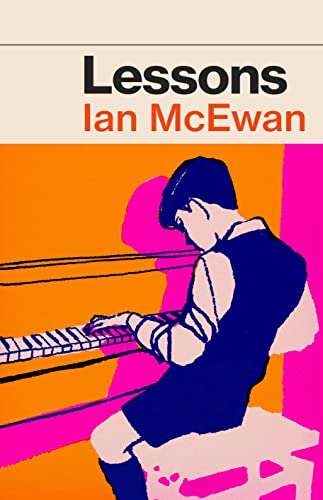McEwans 17th novel is old-fashioned, digressive and indulgently long; the hero is a gold-plated ditherer, and the story opens with a teenage wank (few books are improved by an achingly sentimental wank). But Lessons is also deeply generous. Its compassionate and gentle, and so bereft of cynicism it feels almost radical. Can earnestness be a form of literary rebellion?
In October 1962, at the height of the Cuban missile crisis, an English schoolboy arrives unannounced at his piano teachers house. He stands on her doorstep in his drainpipe trousers and sharp-toed winklepickers, twitchy with eroticised terror. The boy, Roland Baines, is 14; his teacher, Miss Cornell, is 25. Roland fears that the world is about to end, and he will die a virgin. Miss Cornell does not turn him away. What happens between them in that quiet cottage will score a line across Rolands life. It is the moment from which all else fanned out and upwards with the extravagance of a peacocks tail.
The encounter reeks of schoolboy fantasies: an insatiable older woman who offers carnal instruction, then repairs to the kitchen to prepare a Sunday roast. But this discomfort is McEwans point. Roland will forever struggle to give his encounter with Miss Cornell moral shape, to pin down the nature of the harm. He will mistrust his memory, his intentions, his desires. Youll spend the rest of your life looking for what youve had here, Miss Cornell warns him. Thats a prediction, not a curse. It is both.
Roland will drift through an unchosen life a creature of reaction. He will drift into marriage and fatherhood, he will drift from career to career, and he will drift through postwar Britain. The reunification of Europe; glasnost and perestroika; Thatcherism and the Aids crisis; New Labour and the Iraq invasion; Brexit and the pandemic: feckless Roland will drift through it all. By what logic or motivation or helpless surrender did we all, hour by hour, transport ourselves within a generation from the thrill of optimism at Berlins falling wall to the storming of the American Capitol? Lessons asks. Roland is McEwans answer a man who is forever mistaking his indecision for powerlessness, and his comforts for luck. Lessons is a portrait of sociopolitical entropy, a lesson in squandering.
McEwans sights are aimed squarely at the generation to which he belongs: those postwar children who lolled on historys aproned lap, nestling into a little fold of time, eating all the cream. Roland is a prototypical baby boomer: raised by war-haunted veterans, loved at arms length, and schooled in nuanced loutishness. At his state boarding school, young Roland watches his classmates learn to be conservative guardians of the existing order, and perfect their tools of influence: satire, parody, mockery. As an adult, he watches as those same bullyboys weaponise that scorn. And yet, beyond smuggling Bob Dylan records into East Berlin in his 20s, Roland is never quite impelled to do anything; hes complicit in his complacency. Hes voted the right way, after all: his conscience is clear.

